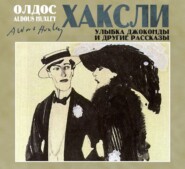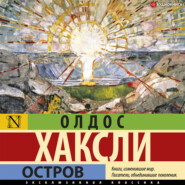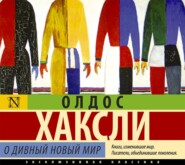По всем вопросам обращайтесь на: info@litportal.ru
(©) 2003-2024.
✖
О дивный новый мир / Brave New World
Автор
Год написания книги
2020
Теги
Настройки чтения
Размер шрифта
Высота строк
Поля
“Yes, he’s coming, I hear him.” Fifi Bradlaugh and Tom Kawaguchi rose simultaneously to their feet.
“Oh, oh, oh!” Joanna testified.
“He’s coming!” yelled Jim Bokanovsky.
“Oh, he’s coming!” screamed Clara Deterding.
Feeling that it was time for him to do something, Bernard also jumped up and shouted: “I hear him; He’s coming.” But it wasn’t true. He heard nothing and, for him, nobody was coming. But he waved his arms, he shouted with the best of them; and when the others began to jig and stamp and shuffle, he also jigged and shuffled.
Round they went, a circular procession of dancers, each with hands on the hips of the dancer in front of them, round and round, shouting in unison, stamping to the rhythm of the music with their feet. Twelve as one, twelve as one. The music quickened. And all at once a great synthetic bass boomed out the words which announced the approaching atonement and final consummation of solidarity, the coming of the Twelve-in-One. “Orgy-porgy,” it sang, while the drums continued to beat their feverish rhythm:
“Orgy-porgy, Ford and fun,
Kiss the girls and make them One.
Boys at One with girls at peace;
Orgy-porgy gives release.”
The dancers caught up the refrain. And as they sang, the lights began slowly to fade—to fade and at the same time to grow warmer, richer, redder, until at last they were dancing in the crimson twilight of an Embryo Store. “Orgy-porgy…” In their blood-coloured darkness the dancers continued for a while to circulate. “Orgy-porgy…” Then the circle wavered, broke, fell in partial disintegration on the ring of couches which surrounded the table. “Orgy-porgy…” Tenderly the deep Voice crooned and cooed.
They were standing on the roof; Big Henry had just sung eleven. The night was calm and warm.
“Wasn’t it wonderful?” said Fifi Bradlaugh. “Wasn’t it simply wonderful?” She looked at Bernard with an expression of rapture. Hers was the calm ecstasy of achieved consummation, the peace. A rich and living peace. “Didn’t you think it was wonderful?” she insisted, looking into Bernard’s face with those supernaturally shining eyes.
“Yes, I thought it was wonderful,” he lied and looked away. He was as miserably isolated now as he had been when the service began. Alone even in Morgana’s embrace—much more alone, indeed, more hopelessly himself than he had ever been in his life before. He was utterly miserable, and perhaps (her shining eyes accused him), perhaps it was his own fault. “Quite wonderful,” he repeated; but the only thing he could think of was Morgana’s eyebrow.
Chapter Six
1
Odd, odd, odd, was Lenina’s verdict on Bernard Marx. So odd, indeed, that in the course of the next few weeks she had wondered more than once whether she shouldn’t change her mind about the New Mexico holiday, and go instead to the North Pole with Benito Hoover. The trouble was that she knew the North Pole, had been there with George Edzel only last summer, and found it pretty grim. Added to that, she had only been to America once before. And even then, a cheap week-end in New York. The prospect of flying West again, and for a whole week, was very inviting. Moreover, for at least three days of that week they would be in the Savage Reservation. As an Alpha-Plus psychologist, Bernard was one of the few men she knew entitled to a permit. For Lenina, the opportunity was unique.
“Alcohol in his blood-surrogate,” was Fanny’s explanation of every eccentricity. But Henry, with whom Lenina had rather anxiously discussed her new lover, had compared poor Bernard to a rhinoceros.
“You can’t teach a rhinoceros tricks,” he had explained. “Some men are almost rhinoceroses; they don’t respond properly to conditioning. Poor Devils! Bernard’s one of them. Luckily for him, he’s pretty good at his job. Otherwise the Director would never have kept him. I think he’s pretty harmless.”
Pretty harmless, perhaps; but also pretty disquieting. That mania, to start with, for doing things in private. Which meant, in practice, not doing anything at all. For what was there that one could do in private. (Apart, of course, from going to bed: but one couldn’t do that all the time.) The first afternoon they went out together was particularly fine. Lenina had suggested a swim at Toquay Country Club followed by dinner at the Oxford Union. But Bernard thought there would be too much of a crowd. Then what about a round of Electro-magnetic Golf at St. Andrew’s? But again, no: Bernard considered that Electro-magnetic Golf was a waste of time.
“Then what’s time for?” asked Lenina in some astonishment.
Apparently, for going walks in the Lake District. “Alone with you, Lenina.”
“But, Bernard, we shall be alone all night.”
Bernard blushed and looked away. “I meant, alone for talking,” he mumbled.
“Talking? But what about?”
In the end she persuaded him, much against his will, to fly over to Amsterdam to see the Women’s Heavyweight Wrestling Championship.
“In a crowd,” he grumbled. “As usual.” He remained gloomy the whole afternoon; wouldn’t talk to Lenina’s friends and refused to take the half-gramme raspberry soma sundae. “I’d rather be myself,” he said. “Myself and nasty. Not somebody else, however jolly.”
Lenina shrugged her shoulders. “A gramme is always better than a damn,” she concluded with dignity, and drank the sundae herself.
On their way back across the Channel, Bernard insisted on stopping his propeller and hovering within a hundred feet of the waves. The weather had taken a change for the worse; a south-westerly wind had sprung up, the sky was cloudy.
“Look,” he commanded.
“But it’s horrible,” said Lenina, shrinking back from the window. She was appalled by the rushing emptiness of the night, by the black water beneath them, by the pale face of the moon. “Let’s turn on the radio!”
“I want to look at the sea in peace,” he said. “One can’t even look with that beastly noise going on.”
“But I don’t want to look.”
“But I do,” he insisted. “It makes me feel as though I am … more. More on my own, not a part of something else.”
Lenina was crying. “It’s horrible, it’s horrible,” she kept repeating. “And how can you talk like that about not wanting to be a part of the social body? After all, everyone works for everyone else. We can’t do without anyone. Even Epsilons…”
“Yes, I know,” said Bernard. “‘Even Epsilons are useful’! So am I. And I damned well wish I weren’t!”
“Bernard, you’re saying the most awful things.”
“Don’t you wish you were free, Lenina?”
“I don’t know what you mean. I am free. Free to have the most wonderful time. Everybody’s happy nowadays.”
He laughed, “Yes, ‘Everybody’s happy nowadays.’ Wouldn’t you like to be free to be happy in some other way, Lenina? In your own way; not in everybody else’s way.”
“I don’t know what you mean,” she repeated. “Oh, do let’s go back, Bernard. I do so hate it here.”
“Don’t you like being with me?”
“I do, Bernard. It’s this horrible place.”
“I thought we’d be more … more together here. More together than in that crowd, or even in my rooms. Don’t you understand that?”
“I don’t understand anything,” she said with decision. “Nothing. Least of all, why you don’t take soma when you have these dreadful ideas of yours.”
He looked at her in silence, his face unresponsive and very grave. After a few seconds Lenina’s eyes flinched away; she uttered a nervous little laugh, tried to think of something to say and couldn’t. The silence prolonged itself.
When Bernard spoke at last, it was in a small tired voice. “All right then,” he said, “we’ll go back.” And stepping hard on the accelerator, he sent the machine up into the sky. They flew in silence for a minute or two. Then, suddenly, Bernard began to laugh.
“Feeling better?” she asked.
For answer, he lifted one hand from the controls and, slipping his arm around her, began to fondle her breasts.
“Thank Ford,” she said to herself, “he’s all right again.”
Half an hour later they were back in his rooms. Bernard swallowed four tablets of soma, turned on the radio and television and began to undress.
















